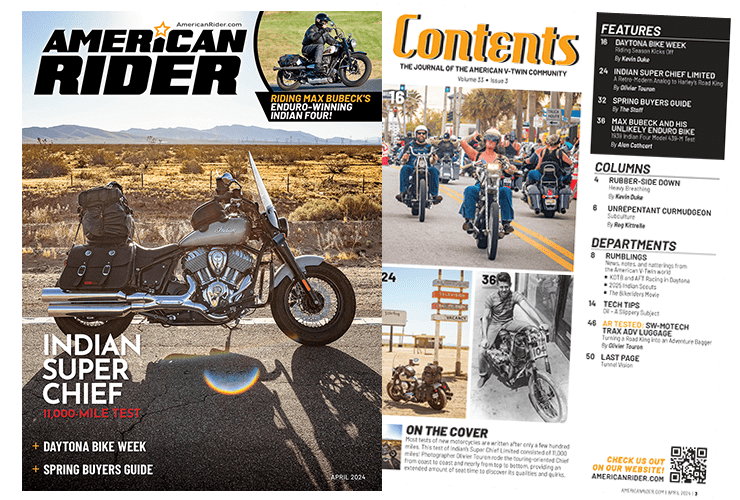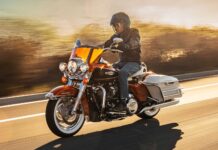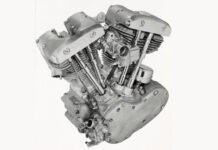If you’re looking here for the story of a bike once owned by Steve McQueen and restored by Von Dutch, like an Indian Big Chief with a sidecar, read no further. Seriously. But if you want to read about a bike whose sale is of equal historical significance and vastly understated, read on.
A decade-and-a-half ago, during motorcycling’s explosive growth years, the world was a different place. If you weren’t a rider “back then.” the rumors you’ve heard are true. Harleys were in such demand that most dealerships had waiting lists of buyers. Not just figuratively, but literally a waiting list of buyers; so many buyers that they were able to mandate high-end option packages for the bikes as they became available. It was capitalism at its finest. The options were different back then in the pre-CVO days; mostly bolt-on chrome covers for one thing or another, but motorcycling and the economy were so good that people would and could buy anything required to be a part of the culture.
There was plenty of grumbling about this phenomenon from the road-weary and weathered set, but I always thought it was good for business. Those glory days brought plenty of new male riders to dealerships, many of whose first bike was a Harley. What was good for the gander was at least interesting to the goose, and many men had wives who wanted their own bikes too. But back then the woman rider who started out on a Harley was the exception. An H-D dealership that had “metric” trade-ins on the floor was also an exception, so many women riders began to ride metric bikes obtained at other dealerships or from private owners. Trickle-down economics, if you will.
Back then, Honda Rebels and Suzuki Savages became very desirable bikes due to their low seat height and light weight. One of our friends, Paula, picked up a super-clean Suzuki Savage. I tried to buy that bike many times over the next several years. It was a nimble little bike, low mileage and super clean, and I figured it would make a great street bike for my kids when they grew up. I hate to see a nice bike get away. Paula got her motorcycle endorsement on the little Savage and named her Petunia. She never “moved on” to a big bike, but instead kept Petunia.
Petunia saw limited duty. There was a large group of riders back then who got together at least once a week to ride. Every few months the group would grow a little bigger and sometimes Petunia would be a part of it. I admired her from afar.
I remember that group being the diversion for getting me out of the house so others could prepare a surprise 40th birthday party for me. We went on a ride to someplace or other, and when we finally pulled back into my driveway late in the afternoon, the place had more bikes parked around it than it did cars!
That was at least 14 years ago. Many of those involved in that informal group have been scattered by time. Some have divorced, some have married, some have divorced and married, and others aren’t even with us on this planet anymore. But I always figured Petunia was gone, until a recent chance conversation with a common friend revealed that Petunia was for sale. Petunia was for sale and I had to find out at the bar in a basement banquet room?
I don’t want her anymore. Not due to spite; just because without the group and the fun, she’s just an old motorcycle. My kids have moved on to lives of their own and my wife and I are content to ride two-up. Petunia needs to go out and find a new rider to enthuse; to give someone new a sense of independence that they want to share with others who understand it. And those others will recognize the authenticity of that enthusiasm created by Petunia and will support and nurture it. My interest in her is merely nostalgic and she needs to be more than that. I once read something to the effect that nostalgia is simply someone repackaging your memories—without the bad parts—and selling them back to you. Petunia had plenty of false starts, popped clutches and catch-it-on-the-second-bounce takeoffs in her day, but I’m not even sure those could be considered the “bad parts.”
She represents a time when it seemed as though the whole world rode, was riding or was going to be riding as soon as they got the money together. Petunia, and bikes like her, represent motorcycling’s golden age to me, and her sale the closing of a chapter.
Hopefully Harley-Davidson’s new Street 750s and 500s will be the bikes that everyone is waxing philosophically about 20 years from now. I hope the Street does more than fill a void that everyone knows existed in the H-D lineup and was never really filled by bikes like Petunia or even the Buell Blast. I hope the Street truly creates a niche for riders to start riding with H-D instead of moving up to it.




















